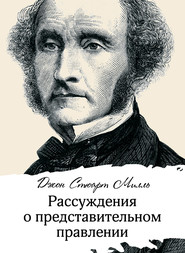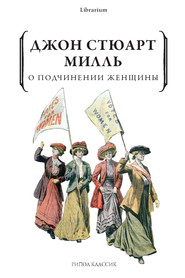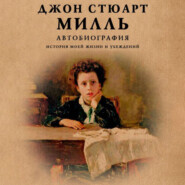По всем вопросам обращайтесь на: info@litportal.ru
(©) 2003-2024.
✖
Autobiography
Настройки чтения
Размер шрифта
Высота строк
Поля
2
The continuation of this article in the second number of the Review was written by me under my father's eye, and (except as practice in composition, in which respect it was, to me, more useful than anything else I ever wrote) was of little or no value.
3
Written about 1861.
4
The steps in my mental growth for which I was indebted to her were far from being those which a person wholly uninformed on the subject would probably suspect. It might be supposed, for instance, that my strong convictions on the complete equality in all legal, political, social, and domestic relations, which ought to exist between men and women, may have been adopted or learnt from her. This was so far from being the fact, that those convictions were among the earliest results of the application of my mind to political subjects, and the strength with which I held them was, as I believe, more than anything else, the originating cause of the interest she felt in me. What is true is that, until I knew her, the opinion was in my mind little more than an abstract principle. I saw no more reason why women should be held in legal subjection to other people, than why men should. I was certain that their interests required fully as much protection as those of men, and were quite as little likely to obtain it without an equal voice in making the laws by which they were bound. But that perception of the vast practical bearings of women's disabilities which found expression in the book on the Subjection of Women was acquired mainly through her teaching. But for her rare knowledge of human nature and comprehension of moral and social influences, though I should doubtless have held my present opinions, I should have had a very insufficient perception of the mode in which the consequences of the inferior position of women intertwine themselves with all the evils of existing society and with all the difficulties of human improvement. I am indeed painfully conscious of how much of her best thoughts on the subject I have failed to reproduce, and how greatly that little treatise falls short of what it would have been if she had put on paper her entire mind on this question, or had lived to revise and improve, as she certainly would have done, my imperfect statement of the case.
5
The only person from whom I received any direct assistence in the preparation of the System of Logic was Mr. Bain, since so justly celebrated for his philosophical writings. He went carefully through the manuscript before it was sent to the press, and enriched it with a great number of additional examples and illustrations from science; many of which, as well as some detached remarks of his own in confirmation of my logical views, I inserted nearly in his own words.
6
A few dedicatory lines acknowledging what the book owed to her, were prefixed to some of the presentation copies of the Political Economy on iets first publication. Her dislike of publicity alone prevented their insertion in the other copies of the work. During the years which intervened between the commencement of my married life and the catastrophe which closed it, the principal occurrences of my outward existence (unless I count as such a first attack of the family disease, and a consequent journey of more than six months for the recovery of health, in Italy, Sicily, and Greece) had reference to my position in the India House. In 1856 I was promoted to the rank of chief of the office in which I had served for upwards of thirty-three years. The appointment, that of Examiner of India Correspondence, was the highest, next to that of Secretary, in the East India Company's home service, involving the general superintendence of all the correspondence with the Indian Governments, except the military, naval, and financial. I held this office as long as it continued to exist, being a little more than two years; after which it pleased Parliament, in other words Lord Palmerston, to put an end to the East india Company as a branch of the government of India under the Crown, and convert the administration of that country into a thing to be scrambled for by the second and third class of English parliamentary politicians. I was the chief manager of the resistance which the Company made to their own political extinction, and to the letters and petitions I wrote for them, and the concluding chapter of my treatise on Representative Government, I must refer for my opinions on the folly and mischief of this ill-considered change. Personally I considered myself a gainer by it, as I had given enough of my life to india, and was not unwilling to retire on the liberal compensation granted. After the change was consummated, Lord Stanley, the first Secretary of State for India, made me the honourable offer of a seat in the Council, and the proposal was subsequently renewed by the Council itself, on the first occasion of its having to supply a vacancy in its own body. But the conditions of Indian government under the new system made me anticipate nothing but useless vexation and waste of effort from any participation in it: and nothing that has since happened has had any tendency to make me regret my refusal.
7
In 1869.
8
The saying of this true hero, after his capture, that he was worth more for hanging than any other purpose, reminds one, by its combination of wit, wisdom, and self-devotion, of Sir Thomas More.
9
The first was in answer to Mr. Lowe's reply to Mr. Bright on the Cattle Plague Bill, and was thought at the time to have helped to get rid of a provision in the Government measure which would have given to landholders a second indemnity, after they had already been once indemnified for the loss of some of their cattle by the increased selling price of the remainder.
10
Among the most active members of the Committee were Mr. P.A. Taylor, M.P., always faithful and energetic in every assertion of the principles of liberty; Mr. Goldwin Smith, Mr. Frederic Harrison, Mr. Slack, Mr. Chamerovzow, Mr. Shaen, and Mr. Chesson, the Honorary Secretary of the Association.
















